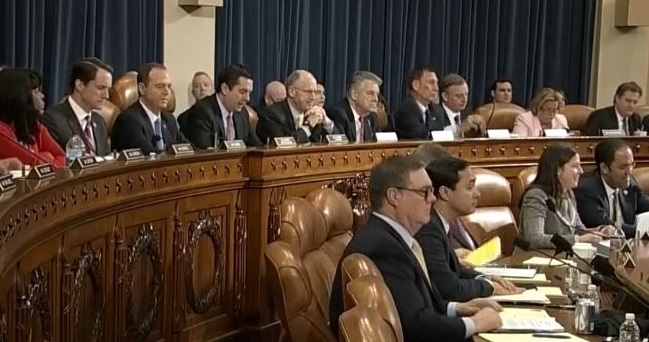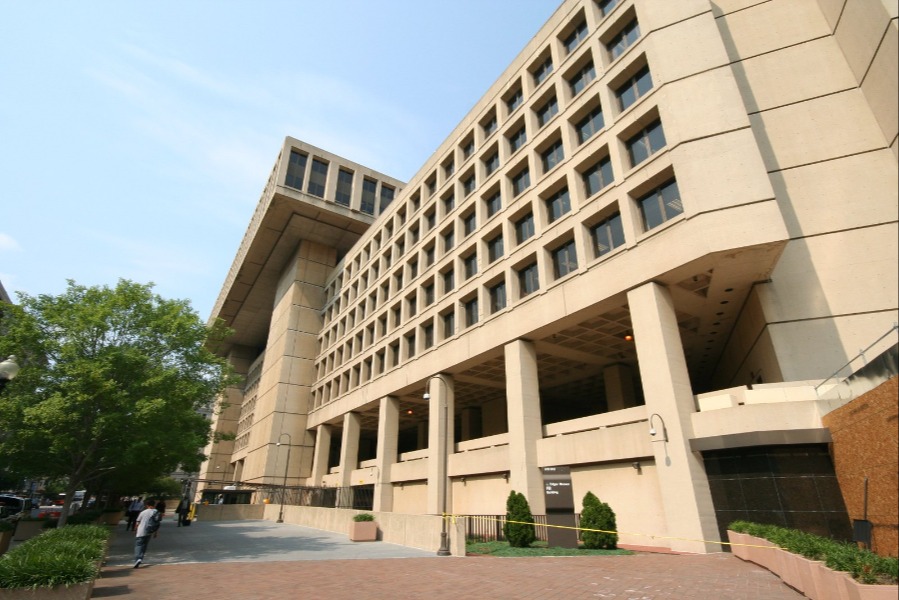Cautionary Notes on a Select Committee for the Russia Matter
I agree with Susan and Ben that an independent national commission to investigate the Russia matter is, at this time, unrealistic. But I’m unconvinced by their argument that a select congressional committee—a specially formed committee in one or both houses of Congress, with special staffing and resources—would be an improvement on the three committees now investigating the matter.

Published by The Lawfare Institute
in Cooperation With

I agree with Susan and Ben that an independent national commission to investigate the Russia matter is, at this time, unrealistic. But I’m unconvinced by their argument that a select congressional committee—a specially formed committee in one or both houses of Congress, with special staffing and resources—would be an improvement on the three committees now investigating the matter. I’m not completely unconvinced, but it is perhaps worth fleshing out counterarguments to their case for a select committee.
The best argument for a select committee is the inappropriate-bordering-on-bizarre behavior last week (and earlier) of HPSCI Chairman Devin Nunes. Nunes has long been in the bag for President Trump. His terrible judgment and his close connection with Trump and some of the actors under investigation has practically destroyed the credibility of the investigation that his committee, under his “leadership,” is conducting on the Russia matter. If the Republicans were smart they would remove Nunes from HPSCI leadership, and fast.
But there are also two other congressional investigations underway. The SSCI Committee, Ben and Susan acknowledge, once viewed “the question of Russian interference in the U.S. election and its ties to campaign figures to be a non-partisan issue related to safeguarding fundamental democracy.” They add that “the SSCI had many of the necessary elements for a successful investigation: Much of the subject matter is already within the committee’s ordinary oversight jurisdiction, and members and staff are cleared to receive highly-classified materials—which is critical for an investigation that involves sensitive ongoing operations.” Moreover, as a committee, the SSCI has until recently acted in a way that “seemed to indicate not only that a serious and thorough investigation was underway, but also that the Committee was prepared to be adversarial with respect to the Trump Administration.” All true, and all good.
The main knock against the SSCI investigation is that the Committee Chairman, Richard Burr, spoke to news organizations at the White House’s request to dispute reports of multiple contacts between the Trump campaign and Russian intelligence operatives. That was a stupid thing to do, and was also a sin Nunes committed. Considered alone it does diminish the credibility of the SSCI investigation. But Burr’s overall conduct has been nothing like Nunes’ behavior, especially his press conference disclosing to the world (and prior to disclosing to his HPSCI colleagues) that he had received information--possibly from the Trump White House--indicating that the Trump transition team conversations had been incidentally collected and named in intelligence reports. In light of the many fruitful and independent actions that SCCI has taken to date, especially in light of the downsides to a select committee investigation (noted below), Burr has not destroyed the possibility and value of a useful, credible and independent SSCI investigation. (Further confirmation of this conclusion comes from SSCI’s prior “formal requests to more than a dozen organizations, agencies and individuals, asking them to preserve all materials related to a probe the panel is conducting on Russian interference in the 2016 election and related issues,” and from this morning’s news that SSCI is seeking “to question Jared Kushner, President Trump’s son-in-law … about meetings he arranged with the Russian ambassador, Sergey I. Kislyak,” including “a previously unreported sit-down with the head of Russia’s state-owned development bank.”)
I find Ben and Susan’s other arguments for a select committee less compelling. They invoke “jurisdictional” objections, and conclude that “the wider the scope of the investigation gets, the less it makes sense to shoehorn such complex and cross-cutting matters into the SSCI’s existing jurisdiction.” But they never identify any concrete issue beyond SSCI’s jurisdiction (though they likely had in mind ethics and business issues). Nor do they consider how SSCI’s investigation might be complemented by a third investigation by the Judiciary Subcommittee on Crime and Terrorism. This one is led by the undoubtedly independent (especially on this issue) Senator Lindsey Graham, joined by Senator Sheldon Whitehouse. The subcommittee has pledged to “Gain a full understanding of the American intelligence community’s assessment that Russia did take an active interest and play a role in the recent American elections, Learn more about the methods Russia has used to target democratic nations and elections, Explore possible avenues to help prevent and deter future foreign influences from impacting American elections and institutions, [and] Assure that Congress provides the FBI the tools it needs to keep its investigative work protected from political influence.” Its jurisdiction is more limited than SSCI’s, but it complements SSCI’s work and diminishes worries about jurisdictional gaps.
Ben and Susan suggest that the current investigations “have a role and should continue” even if a select committee is formed. But that is an unrealistic possibility. Congress is unlikely to fund and staff a full-blown select committee and allow overlapping investigations to continue elsewhere in Congress. So the realistic question is whether a select committee is better as a substitute for the Burr and Graham committees and whatever emerges from HPSCI. In considering that tradeoff, one should consider possible downsides to a select committee:
First, Ben and Susan imply that a select committee investigation will be more independent and credible than the sum of the current investigations. Maybe, maybe not. It depends on whom the Republican-controlled Congress chooses to lead the select committee, and who its members and investigators are. It would be naïve to assume that politics will be eliminated from these decisions, or from the select committee’s work. Ben and Susan are not naive: They acknowledge that the “major disadvantage to a select committee is that it is potentially more subject to political control by congressional leadership, and, through the leadership, by the administration.” They hope for “an even partisan split—or as close to it as is politically doable,” they note that it is “essential that the committee be chaired by a person whose commitment to a serious investigation is not subject to reasonable question,” and they cast their vote for Graham. But it is very doubtful that these things will come to pass, and thus very far from clear that a select committee will be better in terms of independence and credibility than the combined Burr-Warner and Graham-Whitehouse investigations (backstopped, of course, by the FBI investigations).
Put another way: One might have vaguely in mind as a model for the Russiagate select committee the bipartisan Watergate select committee run by Senators Sam Ervin and Howard Baker. (And one might have forgotten that early on, Baker had secret contacts with the White House, which rightly assumed at first that he would protect it.) But the Watergate committee was set up and run by a Congress controlled by a party adverse to the President. Another model for what a select committee here might look like—one that emerged from congressional political alignments more similar to the ones we have now—is the House Select Committee on Benghazi, which was not a credible, bipartisan success. Or perhaps the Russia select committee would end up more like the joint committee that investigated Iran-Contra, which (though set up and run by a Democrat-controlled Congress to investigate a Republican president) issued sharply different majority and minority reports and did not achieve credible, bipartisan success.
The main point is this: We should not commit the nirvana fallacy in assuming that an unknown future select committee will be more independent and credible than the current array of known overlapping and (usefully) redundant investigations. It might end up better. But it very well could end up worse.
Second, there are large start-up and thus delay costs to creating a select committee that Ben and Susan do not discuss. As SSCI member Susan Collins noted (in the context of chiding Burr), the SSCI, which has been on this issue for months now, has ready-made “expertise” and “cleared staff” (i.e. staff with proper security clearances). It will take a long time for Congress overcome the political and legal hurdles to establishing a select committee for the Russia matter. Even if Congress acted tomorrow to create such a committee, which it definitely won't do, it would take months more of organizational haggling and security investigations, possibly lasting until summer, before the committee would be staffed with cleared experts and prepared to take on the Russia matter. Such a delay would push out the time horizon, perhaps quite a lot, for figuring out what happened with Russiagate and thus for taking steps to redress the issues.
Third, and related, is the flip side of Ben and Susan’s good point that SSCI and HPSCI staff are stretched thin with the demands of their important oversight work unrelated to the Russia matter. This is true, but the same reason would disqualify current intelligence staffers from serving on a select committee, since they need to keep at their current work. In light of the unknowns about what a select committee investigation would look like, it is unclear whether it would be more efficient for Congress to bulk up the intelligence staffs temporarily to take on the Russia matter or start from scratch with a new staff of persons with prior intelligence experience on a select committee.
In sum, and to repeat: I am not arguing that the current investigations are in the aggregate more credible and independent than an investigation by a hypothetical select committee would be. I am simply arguing that the case for a select committee has not been made. There are many hurdles and several large costs to changing course now, and the gains would not obviously be worth the change, and might well lead the nation to a worse outcome.




